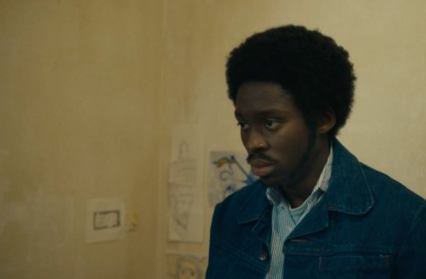Matt Taylor reviews Alex Wheatle, the fourth film in Steve McQueen’s five-part anthology shining a spotlight on Black British history.

If you’re not watching Small Axe by now, I don’t know what more to tell you. Week in and week out, Steve McQueen has treated his audience to some really special movies, and the fourth is no exception. Alex Wheatle, although a marginal step down from the quality of the first three films, is an excellent biopic that shines a light on aspects of Britain’s history that are so often glossed over, and does it with style.
This week’s film tells the story of, you guessed it, Alex Wheatle, an author who’s written 15 YA novels – but that’s not what the film is about. What McQueen chooses to focus on is Wheatle’s early years, from his childhood in a foster home to his arrest after the 1981 Brixton riots. The bulk of the narrative is told to Alex’s cellmate in prison via flashback – although a fairly conventional approach to a biopic, it’s one that works for what McQueen is trying to achieve.
What he’s trying to achieve is the same as what he’s been trying to do with all the Small Axe films to date: to use his platform to tell a story that needs to be told, because it is unknown to so many Brits living in the UK today. More so than the rest in some ways, Alex Wheatle is a movie that does a lot with a little; its 65-minute runtime is certainly brisk, but the film never feels underbaked. It leaves us with questions, certainly, but McQueen’s narrative and directorial choices are so streamlined and tight-knit that we do feel as though he’s given us a full picture of what he’s examined.
That picture is consistently engaging, as we’ve come to expect by now. The acting is superb, and everyone brings McQueen and Alastair Siddons’ dialogue fantastically to life. Sheyi Cole takes the lead as Alex and is excellent in the role. Alex is a fish out of water in Brixton, but in a different way to what we’ve seen in Small Axe before: where Leroy Logan struggled because of the racism he faced because of his heritage, Alex struggles because he doesn’t know his heritage to begin with. Having grown up in all-white foster homes, he’s completely out of touch with his roots.
This is something that leads to some delightful Oliver Twist-Esque scenes when Alex first moves to Brixton, with Jonathan Jules taking up the film’s Fagin role and giving way to some wonderful banter between him and Cole. The dialogue of their scenes is elevated by the pair’s naturally exciting chemistry, and even though we don’t get too long with them, it’s easy for us to be invested in their pairing.
The natural chemistry that Cole and Jones have carries over to the rest of the cast, too: Robbie Gee makes a particularly solid impact as Simeon, Alex’s cellmate after he’s imprisoned following the riots. It’s Simeon who’s really the heart of the film: he’s the one who pushes Alex to confront himself and his history, and what he says can be applied to the whole of the UK in the 21st century.
It’s this core that makes Wheatle a piece that’s as reflective internally as it is externally; as Simeon says to Alex, “if you don’t know your past, then you won’t know your future.” Not only is this what Alex needs to hear to start figuring out who he is and moving on with his life, but it’s something that everyone in the UK needs to hear right now. 2020 has many of us grappling with Britain’s awfully racist past, and although this isn’t a comfortable journey to go through, it’s absolutely necessary. To quote Simeon again, “education is the key” – and such words have never been so prevalent.
It’s a shame to say, then, that for all the excellent work Wheatle does, it feels like a step down from the films we’ve seen in previous weeks. It’s quite hard to pinpoint exactly why this is, but it feels as though there’s something missing. Alex Wheatle distinctly lacks the ferocity of Red, White and Blue, the ethereality of Lovers Rock, and the sheer emotional engagement of Mangrove. If we took Wheatle in isolation then this would probably not be an issue, but when it comes after such trailblazing works it feels a little … conventional.
Still, despite that, it’s hard to deny everything Alex Wheatle does so excellently. Conventional though it may be, it remains a fascinating little biopic of a man so few of us know anything about. But yet again, Small Axe has changed that. Again I implore you if you haven’t yet seen these films, seek them out immediately. You will not regret it.
Alex Wheatle as well as the other Steve McQueen films that explore black British history in the Small Axe series are available to stream now on BBC iPlayer.
Matt Taylor is a regular contributor at Wales Arts Review.











